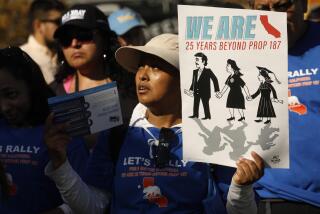American Minorities Try to Hold the Line : Immigration: Latinos, Asians and blacks are the first to feel the squeeze of illegal residents.
Ethnic political organizations campaigning against Proposition 187 are doing an injustice to the minority groups they claim to represent. Polls have shown repeatedly that most members of minority groups, including Latinos, wish to see reductions in immigration, both legal and illegal.
Antonia Hernandez, president of the Mexican American Legal Defense and Educational Fund, has said that “migration, legal and undocumented . . . (greatly increases job) competition within the Latino community. . . . There is an issue of wage depression, as in the garment industry, which is predominantly immigrant.”
Presumably motivated by similar concerns, United Farm Workers co-founder Dolores Huerta told a state Assembly committee: “With 1.5 million legalized immigrants living in California, and only approximately 250,000 agricultural jobs in the state, there is no need for additional farm workers.”
Lora Jo Foo of the Asian Law Caucus has noted that longtime legal residents are seeing “their wages and working conditions eroded by undocumented workers and new (legal) immigrants.” A Chinatown waitress said recently that she makes $300 a month, working 60 hours a week--a salary of about $1 an hour.
Po Wong of the Chinese Newcomer Service Center in San Francisco protested that the community could not handle the influx of legal immigrants, much less absorb the illegal population.
A 1988 General Accounting Office study of the Los Angeles hotel industry found that jobs formerly held by African Americans were now done mainly by immigrants. Studies have shown a similar displacement of blacks in the restaurant industry.
Further light is shed on the matter by Proposition 186, the single-payer health plan on the November ballot. Dr. Floyd Huen has been campaigning for 186, emphasizing its benefits to minority groups. It is thus significant that Huen recently stated that the measure excludes coverage for illegal residents because “otherwise, the cost would be tremendous, and we wouldn’t be able to provide benefits for the legal residents.”
The ethnic political organizations assert that 187’s exclusion of undocumented children from public schools would result in the kids roaming the streets. This claim is an egregious insult to the parents. They would find ways to cope, such as putting the kids in Catholic schools, which the church, which opposes 187, would be obligated to expand; or the children could be sent back to their home countries to live with relatives and go to school there.
The ethnic activists also are weakening the precious bonds between teachers and minority students by saying that 187 would turn teachers into snitches, having to report to the Immigration and Naturalization Service any student suspected of being in the United States illegally.
This is clearly false. The initiative requires school administrators, not teachers, to do the checking.
Critics of 187 note that the legislative analyst has stated that its INS reporting requirements might place at risk some federal funding. But the critics omit the Legislative Analyst’s observation that in such a case, most likely the state and federal governments would work together to iron things out.
Almost any piece of legislation has flaws that must be amended later. Proposition 187 would be no exception. Ethnic political activists are portraying Proposition 187 as a “white” issue. It most definitely is not. All legal residents, minorities in particular, are adversely affected by the flow of the undocumented into our state.
Norman Matloff is a professor at UC Davis, where he has served as chairman of the affirmative action committee.
More to Read
Sign up for Essential California
The most important California stories and recommendations in your inbox every morning.
You may occasionally receive promotional content from the Los Angeles Times.










